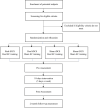Disgust-reduction evaluative conditioning (DREC) and brain stimulation in patients with contamination-based obsessive-compulsive disorder: a protocol for a randomized control trial
- PMID: 38001473
- PMCID: PMC10675853
- DOI: 10.1186/s13063-023-07791-2
Disgust-reduction evaluative conditioning (DREC) and brain stimulation in patients with contamination-based obsessive-compulsive disorder: a protocol for a randomized control trial
Abstract
Background: The negative emotional valence of a stimulus can be altered if paired with a pleasant stimulus, a phenomenon referred to as evaluative conditioning. Disgust, as a central emotion in obsessive-compulsive disorder (OCD), particularly in the contamination subtype, may be an appropriate target for such a method. We know that disgust processing and OCD pathophysiology share in some brain areas, including the orbitofrontal cortex, as the neuromodulation techniques targeted in this area have been able to decrease OCD symptoms. We aim to conduct a randomized clinical trial to investigate the evaluative conditioning effect on disgust reduction in patients with contamination-based OCD when administered with or without neuromodulation targeted orbitofrontal cortex.
Method: In a single-blind randomized control trial (RCT), 55 patients with contamination-based OCD will be randomly assigned to four arms. In a factorial design, they will receive 10 sessions of evaluative conditioning training (either sham or real) plus cathodal transcranial direct current stimulation (tDCS) over the orbitofrontal cortex (either sham or real). The intensity of disgust experience and clinical symptoms will be investigated as primary outcomes and quantitative electroencephalogram and cognitive functions as secondary outcomes. The data will be collected at three assessment levels: baseline, after completing intervention sessions, and 2-month follow-up.
Discussion: The present RCT is the first study that applies evaluative conditioning training in the OCD clinical sample. It will clarify the effect of the evaluative conditioning method alone and with tDCS on disgust reduction in patients with contamination-based OCD. It will provide initial evidence for such an emotion modulation method in the OCD population. The effect of this emotion-focused protocol on cognitive functions and electroencephalogram components is also of interest.
Trial registration: ClinicalTrials.gov, NCT05907369. Registered on 16 June 2023. Retrospectively registered.
Keywords: Contamination symptom; Disgust; Evaluative Conditioning; Obsessive-compulsive disorder; Orbitofrontal cortex; Transcranial direct current stimulation.
© 2023. The Author(s).
Conflict of interest statement
The authors declare that they have no competing interests.
Similar articles
-
The safety and efficacy of transcranial direct current stimulation as add-on therapy to fluoxetine in obsessive-compulsive disorder: a randomized, double-blind, sham-controlled, clinical trial.BMC Psychiatry. 2020 Nov 30;20(1):570. doi: 10.1186/s12888-020-02979-1. BMC Psychiatry. 2020. PMID: 33256659 Free PMC article. Clinical Trial.
-
Disgust and obsessive-compulsive disorder: an update.Psychiatry. 2006 Fall;69(3):228-38. doi: 10.1521/psyc.2006.69.3.228. Psychiatry. 2006. PMID: 17040174 Review.
-
Transcranial direct current stimulation in patients with obsessive compulsive disorder: A randomized controlled trial.Eur Psychiatry. 2019 Oct;62:38-44. doi: 10.1016/j.eurpsy.2019.08.011. Epub 2019 Sep 13. Eur Psychiatry. 2019. PMID: 31525581 Clinical Trial.
-
Targeting the prefrontal-supplementary motor network in obsessive-compulsive disorder with intensified electrical stimulation in two dosages: a randomized, controlled trial.Transl Psychiatry. 2024 Feb 5;14(1):78. doi: 10.1038/s41398-024-02736-y. Transl Psychiatry. 2024. PMID: 38316750 Free PMC article. Clinical Trial.
-
Effective behavioural strategies for reducing disgust in contamination-related OCD: A review.Clin Psychol Rev. 2015 Dec;42:116-29. doi: 10.1016/j.cpr.2015.07.001. Epub 2015 Jul 3. Clin Psychol Rev. 2015. PMID: 26190372 Review.
References
-
- American Psychiatric Association . Diagnostic and statistical manual of mental disorders. 5. S.L.: American Psychiatric Association; 2022.
-
- Benzina N, Mallet L, Burguière E, N’Diaye K, Pelissolo A. Cognitive dysfunction in obsessive-compulsive disorder. Curr Psychiatry Rep. 2016;18(9) 10.1007/s11920-016-0720-3. - PubMed
Publication types
MeSH terms
Associated data
LinkOut - more resources
Full Text Sources
Medical


